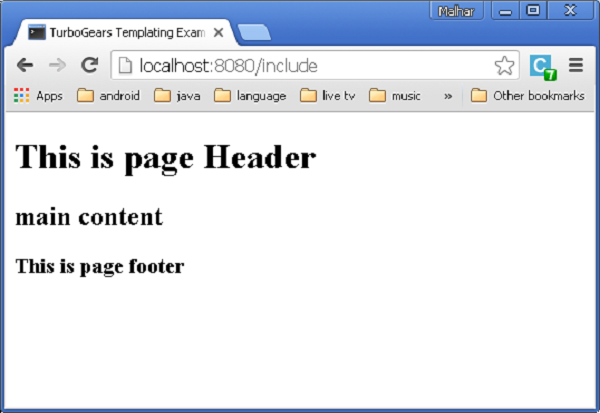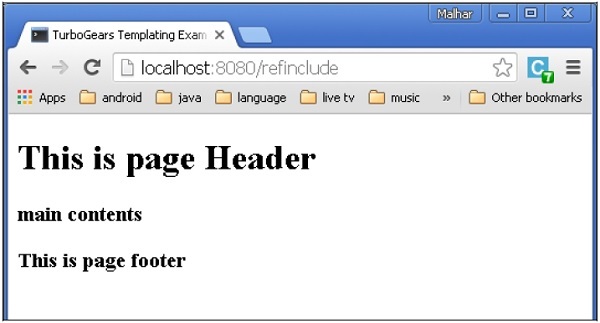TurboGears - 包含
可以使用包含标签将另一个 XML 文档(尤其是 HTML 文档)的内容包含在当前文档中。为了实现这种包含,必须在 HTML 文档的根元素中声明 XInclude 命名空间。
<html xmlns = "http://www.w3.org/1999/xhtml" xmlns:xi = "http://www.w3.org/2001/XInclude >
上述声明指定 include 指令包含 'xi' 前缀。要在当前文档中添加另一个 html 页面的内容,请使用 xi:include 指令,如下所示 −
<xi:include href = "somepage.html" />
在下面的示例中,root.py 包含 include() 控制器,该控制器公开 include.html。
from hello.lib.base import BaseController
from tg import expose, request
class RootController(BaseController):
@expose('hello.templates.include')
def include(self):
return {}
标题和页脚 HTML
在 include.html 中,声明了包含命名空间,并添加了 header.html 和 footer.html 的内容。以下是 templates\include.html 的 HTML 脚本 −
<html xmlns = "http://www.w3.org/1999/xhtml"
xmlns:xi = "http://www.w3.org/2001/XInclude">
<head>
<title>TurboGears Templating Example</title>
</head>
<body>
<xi:include href = "heading.html" />
<h2>main content </h2>
<xi:include href = "footer.html" />
</body>
</html>
这是 templates\heading.html 代码 −
<html>
<head>
<title>TurboGears Templating Example</title>
</head>
<body>
<h1>This is page Header</h1>
</body>
</html>
以下是templates\footer.html
<html>
<head>
<title>TurboGears Templating Example</title>
</head>
<body>
<h3>This is page footer</h3>
</body>
</html>
使用 gearbox 开始开发,并在浏览器中输入 http://localhost:8080/include。渲染的输出将如下所示 −

这样就可以实现视图的模块化构建。如果 xi:include 指令中提到的资源不可用,则会引发错误。在这种情况下,可以使用 xi:fallback 加载替代资源。
<xi:include href = "main.html"> <xi:fallback href = "default.html"/> </xi.include>
可以将内容包含动态化为可以包含表达式的 href 属性。
在 root.py 中添加以下控制器。
@expose('hello.templates.ref-include')
def refinclude(self):
return {'pages':['heading','main','footer']}
将以下代码保存为模板文件夹中的 ref-include.html。
<html xmlns = "http://www.w3.org/1999/xhtml"
xmlns:py = "http://genshi.edgewall.org/"
xmlns:xi = "http://www.w3.org/2001/XInclude">
<head>
<title>TurboGears Templating Example</title>
</head>
<body>
<xi:include href = "${name}.html" py:for = "name in pages" />
</body>
</html>
在启动服务器之前,请确保模板文件夹包含heading.html、main.html和footer.html。在浏览器中输入http://localhost:8082/refinclude可获得以下输出



